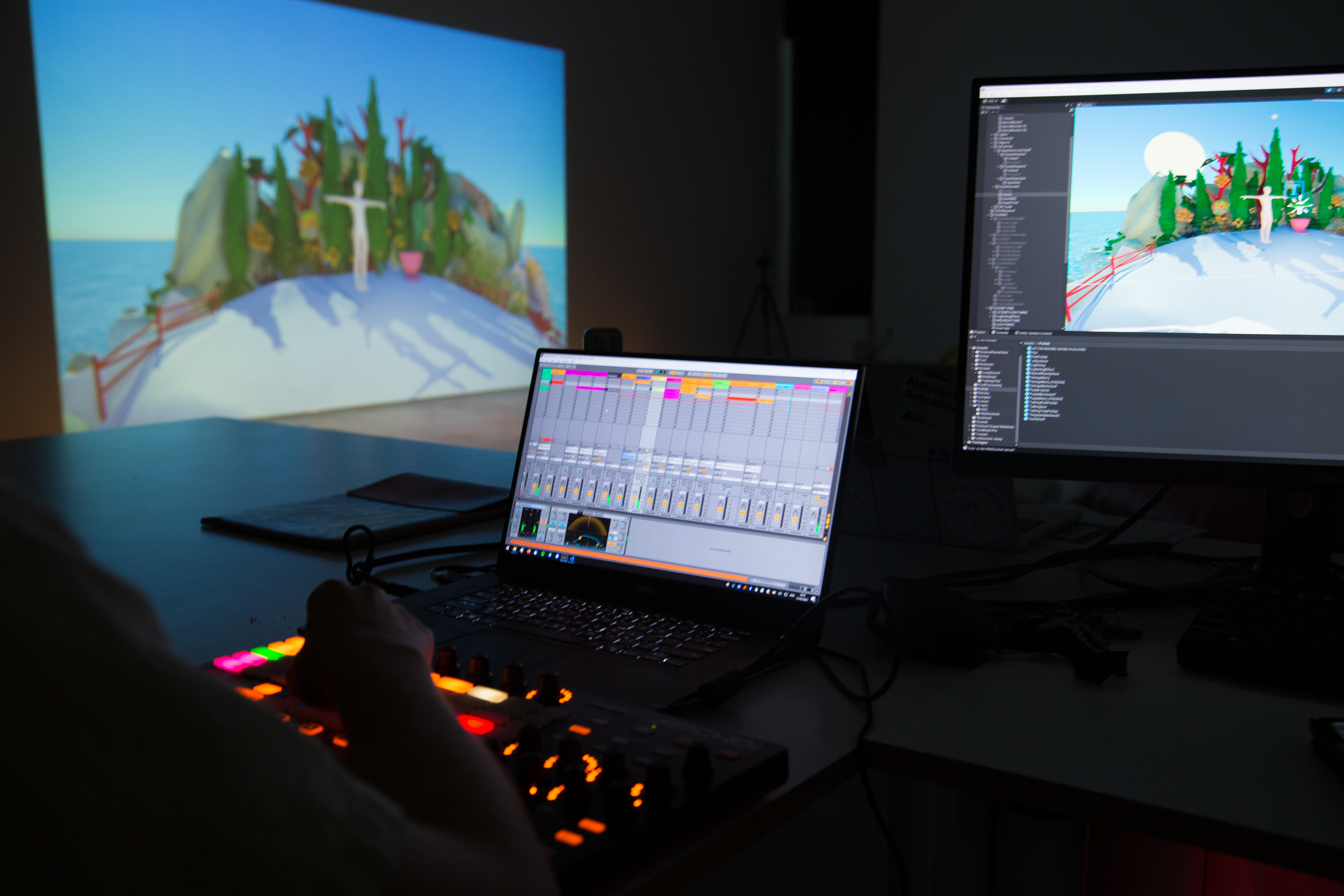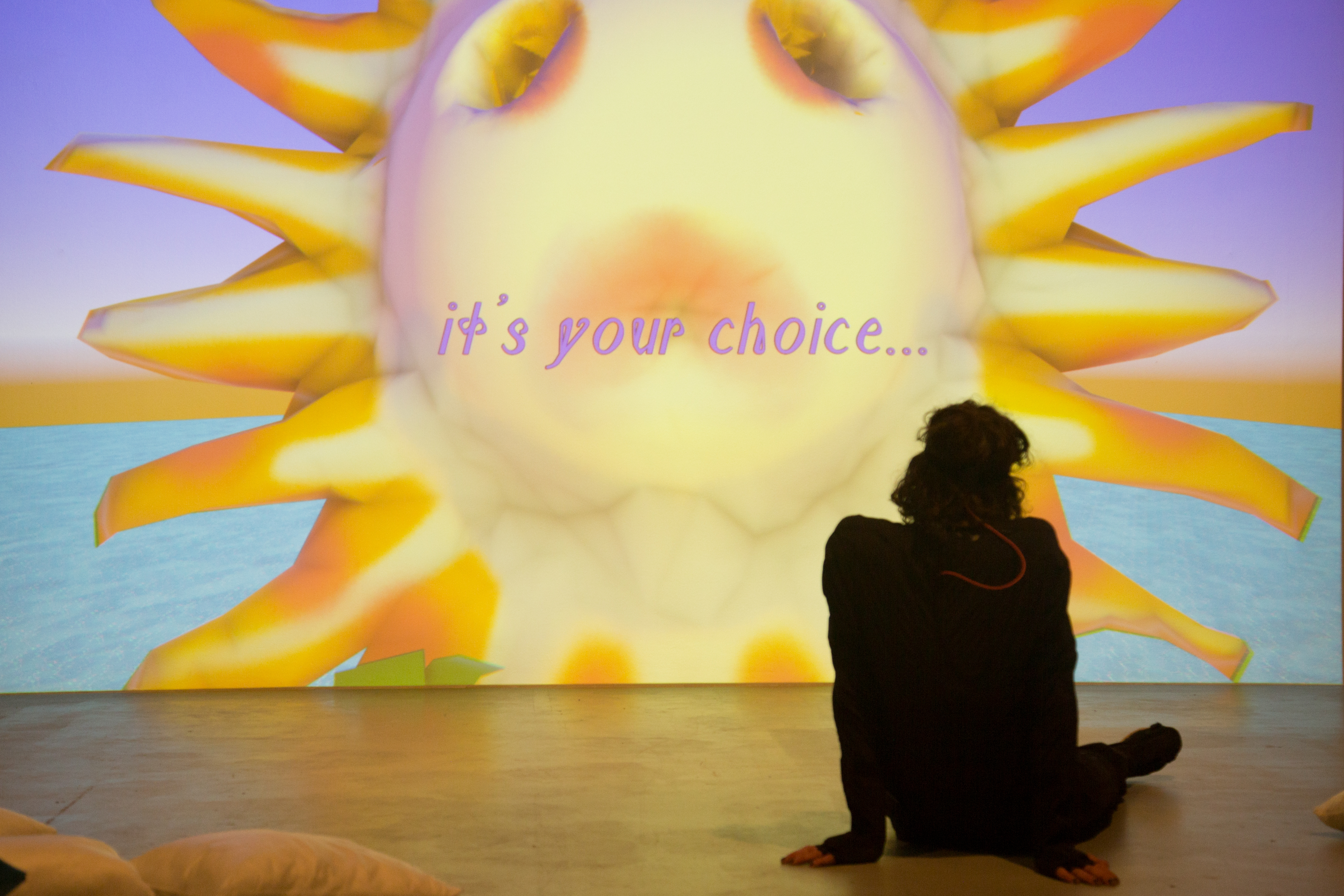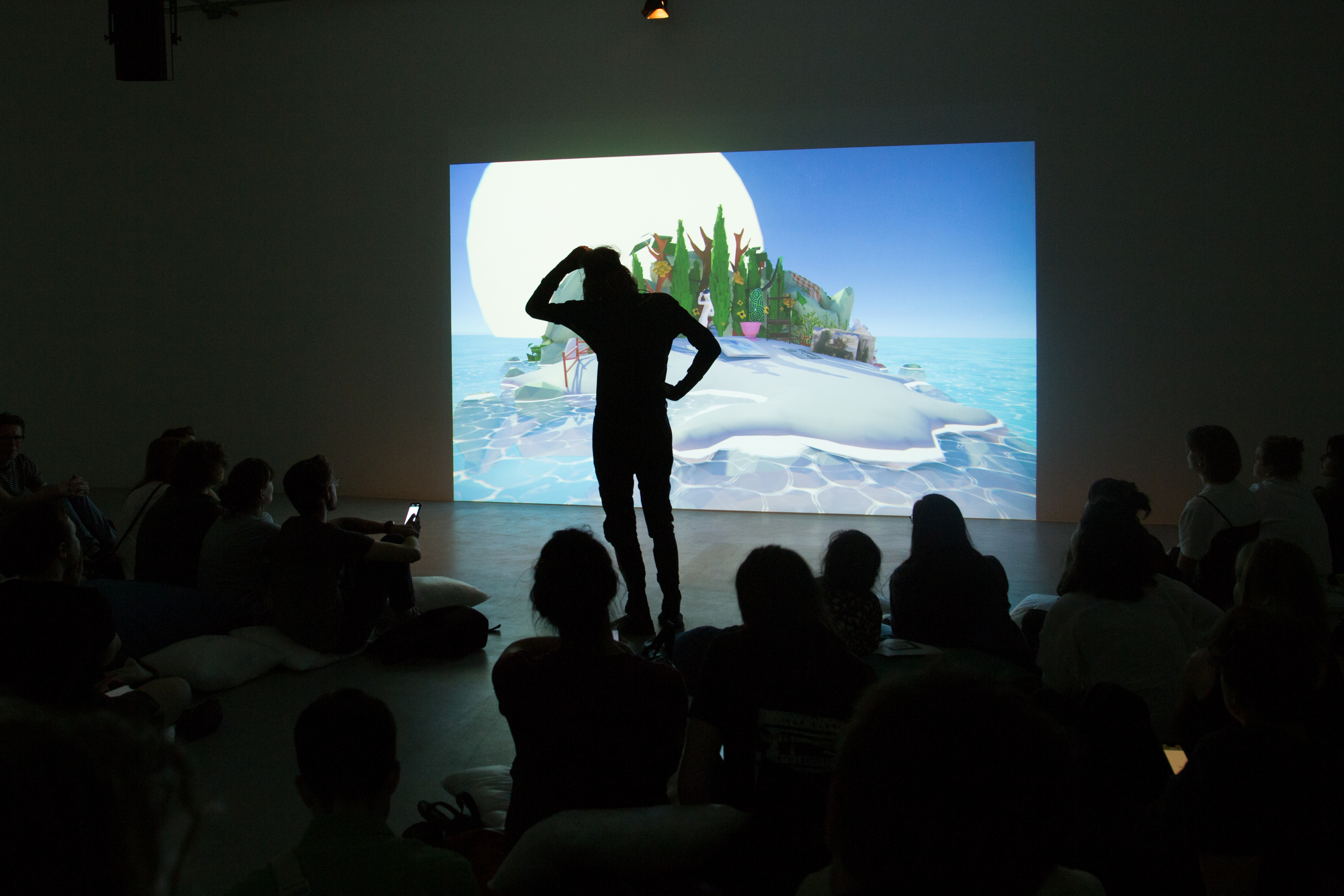The Great Idle by Benjamin Pompe: Difference between revisions
(Created page with "Case Study") |
|||
| (3 intermediate revisions by the same user not shown) | |||
| Line 1: | Line 1: | ||
== The Great Idle == | |||
=== A mixed reality performance by Benjamin Pompe === | |||
<span class="author">IMPAKT</span> | |||
"The Great Idle" is a mixed reality performance by Benjamin Pompe comissioned by IMPAKT. This commission (and the ''Project Stargaze'' by Roos Groothuizen and Derk Over) were funded by the province of Utrecht through its Talented Makers Support Package (''Presentatieregeling talentvolle makers''). | |||
The performance centers on the activities of a solitary character living on an island. Online and on-site audiences are given a series of choices that decide the actions and fate of the character's existence on the island. | |||
[[File:002 IMG 7022 tashaarlova thegreatidle.jpg|center|Technical set up for Benjamin Pompe's 'The Great Idle' at IMPAKT Center]] | |||
[[File:1 tashaarlova_thegreatidle.jpg|center|Mo-cap performer in front of the loading screen for 'The Great Idle']] | |||
The character is puppetteered by a performer wearing a full-body motion-capture (Mo-Cap) suit. This performer stands in the IMPAKT exhibition space, directly in front of the projection the displays the gameplay view of the character on the island. The on-site guests can easily see the mirroring of the performers movements and the character's. Online guests can also see the performer's movements through the cameras placed in the exhibition space. | |||
[[File:033 IMG 7193 tashaarlova thegreatidle.jpg|center]] | |||
Online audience members accessed the performance through the [[Planet IMPAKT|Planet IMPAKT portal]], and saw the performance as a livestream– each participant could choose to look at either the gameplay view or the entirety of the in-house exhibition space. Both the in-house and online audience were asked to access a browser-based app. At key moments in the performance, the audience members were prompted to respond to an either/or choice (e.g. should it rain, or be sunny). Each prompt provided two options to chose from. The options of each choice were only visible on the browser-based app. However, the tally of votes for ''option 1'' or ''option 2'' were visible on screen in the gameplay view. This meant that the number of votes submitted for either option were visible to both on-site and online players. | |||
However, the app alternated between prompting the online and on-sit audiences: the choices that were offered to the online audience, as well as their responses, were obscured from the on-site audience (and vice versa). This meant that, for example, the online audience's choice to collect rain boots instead of a sun hat became fatal when the on-site audience decided it would be blisteringly sunny instead of rainy. | |||
Make it Participatory | |||
By prompting attendees of the performance to participate in the voting through the browser-based app, guests became participants. Online and on-site participants of the performance had equal weight in their participation. Both were grouped into collectivities based on the locality of their participation. | |||
Create collectivity | |||
Although the on-site and online participants were not directly visible to each other through audio-visual mediums, they were visible in the tallying of votes. The votes appeared as they came in, and ping-ed with a sound announcing the new incoming vote. In addition to the suspense that this created, it also gave a concrete sense of the number of people attending, and the rhythm of participation– which further reinforced the sense of synchronicity between sites of participation. | |||
Latest revision as of 12:45, 25 July 2023
The Great Idle
A mixed reality performance by Benjamin Pompe
"The Great Idle" is a mixed reality performance by Benjamin Pompe comissioned by IMPAKT. This commission (and the Project Stargaze by Roos Groothuizen and Derk Over) were funded by the province of Utrecht through its Talented Makers Support Package (Presentatieregeling talentvolle makers).
The performance centers on the activities of a solitary character living on an island. Online and on-site audiences are given a series of choices that decide the actions and fate of the character's existence on the island.
The character is puppetteered by a performer wearing a full-body motion-capture (Mo-Cap) suit. This performer stands in the IMPAKT exhibition space, directly in front of the projection the displays the gameplay view of the character on the island. The on-site guests can easily see the mirroring of the performers movements and the character's. Online guests can also see the performer's movements through the cameras placed in the exhibition space.
Online audience members accessed the performance through the Planet IMPAKT portal, and saw the performance as a livestream– each participant could choose to look at either the gameplay view or the entirety of the in-house exhibition space. Both the in-house and online audience were asked to access a browser-based app. At key moments in the performance, the audience members were prompted to respond to an either/or choice (e.g. should it rain, or be sunny). Each prompt provided two options to chose from. The options of each choice were only visible on the browser-based app. However, the tally of votes for option 1 or option 2 were visible on screen in the gameplay view. This meant that the number of votes submitted for either option were visible to both on-site and online players.
However, the app alternated between prompting the online and on-sit audiences: the choices that were offered to the online audience, as well as their responses, were obscured from the on-site audience (and vice versa). This meant that, for example, the online audience's choice to collect rain boots instead of a sun hat became fatal when the on-site audience decided it would be blisteringly sunny instead of rainy.
Make it Participatory
By prompting attendees of the performance to participate in the voting through the browser-based app, guests became participants. Online and on-site participants of the performance had equal weight in their participation. Both were grouped into collectivities based on the locality of their participation.
Create collectivity
Although the on-site and online participants were not directly visible to each other through audio-visual mediums, they were visible in the tallying of votes. The votes appeared as they came in, and ping-ed with a sound announcing the new incoming vote. In addition to the suspense that this created, it also gave a concrete sense of the number of people attending, and the rhythm of participation– which further reinforced the sense of synchronicity between sites of participation.


